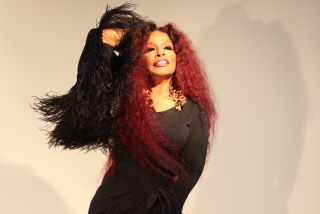Disabled Rock Singer Takes On Troubadour
- Share via
Dorik Perman is a rock-and-roll entertainer. He’s got cool shades, weird clothes, a briefcase full of his own music, a fancy stage show and a foxy backup who is also his real-live nurse. He’s also got a wheelchair, and he’s got a problem.
The wheelchair is a necessity because Perman is a paraplegic, disabled since childhood with muscular dystrophy. The problem, he said, is getting a booking at the Troubadour, one of the Sunset Strip’s legendary rock-and-roll clubs.
A lot of musicians have trouble getting bookings at a lot of clubs, especially new talent. But Perman, 34, has filed a complaint with the state Department of Fair Employment and Housing, charging that the Troubadour has refused to book him because of his handicap.
“They told me they’d heard I had a following of 50 wheelchair groupies coming to watch me perform and they couldn’t have that stampede,” said Perman.
Troubadour officials deny that they discriminated against Perman. Instead, they said the refusal was based on his ability, or inability, to draw an audience.
No Following
“He does not have a following, and those who don’t, we don’t book. That’s just business,” said Gina Barsamian, who is in charge of bookings for the club. She said that the booking agent who talked to Perman no longer works for them.
But, she added, “We are not equipped for wheelchairs on our stage. There’s no ramp and by the time you get the music equipment on stage, there is not room for a wheelchair. This would be for his own safety, too.”
Perman, who has received good reviews from rock critics as a newcomer, has played other local clubs--the Roxy, Gazzarri’s, Club Lingerie, FM Station, Coconut Teaszer--with little problem.
But, as he warned in a half-page advertisement he took out in the monthly magazine In Concert:
“They (the Troubadour) are (messing) with the wrong disabled dude.”
Perman said the booking agent made the “discriminatory” remark to him after his audition several months ago: “I called back and told them to check with other clubs, that I don’t bring in a lot of audience in wheelchairs, and even if I did, so what?
Only then, he alleges, did the club management change its tune. He was told a check had been made with another club and it revealed he couldn’t draw a large audience. “I told them to call some others, because I did have a bad audience in that particular instance because I was playing the midnight spot at the end of a three-day weekend.”
‘We’re Booked Up’
Then he called back and got another story, he said. “This time it was, ‘We’re booked up.’ ”
Steve White, a senior consultant with the state Department of Fair Employment and Housing, said that the agency has received the complaint. Officials have not yet interviewed Perman about his charges, the first step in the complaint process.
Meanwhile, other local clubs said they have had no qualms booking the wheelchair-bound musician.
“There were no problems the several times we have played him,” said Bill Gazzarri, owner of Gazzarri’s. “We just got him up on stage and let him perform.” He added, he could not remember the size of the audiences.
A former free-lance writer from San Francisco, Perman started playing keyboards and synthesizers as physical therapy for his hands, of which he has limited use. One thing led to another, and soon he was writing music, making tapes.
His practical nurse Debra Dae, who had played guitar off and on all her life, accompanied him. Friends told them they were good enough to go professional, so they developed a Las Vegas-like act, in which they have props and wear costumes to correspond with the songs.
Perman acknowledges that there is some publicity value in his disability. And sometimes Dae dresses in a version of her professional attire, a short nurse’s outfit with spike heels. But, he said, there are limits on how far he will go to capitalize on his condition.
One producer suggested that Perman dress up his wheelchair. Someone else suggested he write a “wheelchair rap.”
“That would be too much like a sideshow,” he said. “I figure I’m doing some trailblazing and I want to be judged by my music, to show people that handicaps aren’t necessarily handicaps.”
More to Read
The biggest entertainment stories
Get our big stories about Hollywood, film, television, music, arts, culture and more right in your inbox as soon as they publish.
You may occasionally receive promotional content from the Los Angeles Times.








